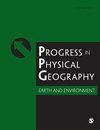地理过程对景观恢复的响应:中国的研究进展
IF 3.6
3区 地球科学
Q2 GEOGRAPHY, PHYSICAL
Progress in Physical Geography-Earth and Environment
Pub Date : 2023-05-15
DOI:10.1177/03091333231175805
引用次数: 2
摘要
联合国生态系统恢复十年(2021-2030年)为将生态系统恢复工作扩大到景观恢复提供了新的动力。中国最近在景观恢复方面的转型投资经验为世界提供了宝贵的指导。本文回顾了地理异质性下自然、生态和社会过程对中国景观恢复响应的科学证据,总结了四点经验和教训。首先,中国森林景观恢复成功促进了植被生长,扩大了碳汇。二是景观恢复降低了局地产水量,但降雨的区域响应尚不明确。③景观恢复在很大程度上改善了土壤侵蚀和生境质量的局部条件,而土壤湿度和河流流量的减少则表现出生态系统服务之间的显著权衡。最后,当地生计对景观恢复策略的响应存在地域差异,不同景观背景下人类发展与自然改善的双赢解决方案仍不确定。我们总结了另外三个问题作为未来的展望:防止过度和连锁负面生态影响的阈值是多大?人们对自然的优先需求是什么?考虑到可能没有普遍的共赢之路,如何基于区域的人与自然关系促进共同利益?本文章由计算机程序翻译,如有差异,请以英文原文为准。
The response of geographical processes to landscape restoration: China’s research progress
The UN Decade of Ecosystem Restoration (2021–2030) provides a new momentum for scaling up ecosystem restoration efforts to landscape restoration. China’s recent experience with transformative investment in landscape restoration provides invaluable guidance for the world. We retrospectively reviewed the scientific evidence on the responses of physical, ecological, and social processes to China’s landscape restoration under geographic heterogeneity and obtained four experiences and lessons. First, China’s forest landscape restoration has successfully promoted vegetation growth and enlarged the carbon sink. Second, landscape restoration has reduced the local water yield, while the regional responses of rainfall are still not clear. Third, the local conditions of soil erosion and habitat quality were largely improved by landscape restoration, while the decreases in soil moisture and streamflow demonstrated significant trade-offs among ecosystem services. Last, geographical differentiation existed in the local responses of livelihoods to landscape restoration strategies, and the win‒win solutions between human development and nature improvement under different landscape contexts were still uncertain. We summarize three additional questions as future prospects: what is the scale of the thresholds to prevent overshoot and cascading negative ecological effects? what are people’s prior needs from nature? considering that there may be no universal win‒win pathways, how to promote co-benefits based on regional human–nature relationships?
求助全文
通过发布文献求助,成功后即可免费获取论文全文。
去求助
来源期刊
CiteScore
7.20
自引率
5.10%
发文量
53
审稿时长
>12 weeks
期刊介绍:
Progress in Physical Geography is a peer-reviewed, international journal, encompassing an interdisciplinary approach incorporating the latest developments and debates within Physical Geography and interrelated fields across the Earth, Biological and Ecological System Sciences.

 求助内容:
求助内容: 应助结果提醒方式:
应助结果提醒方式:


